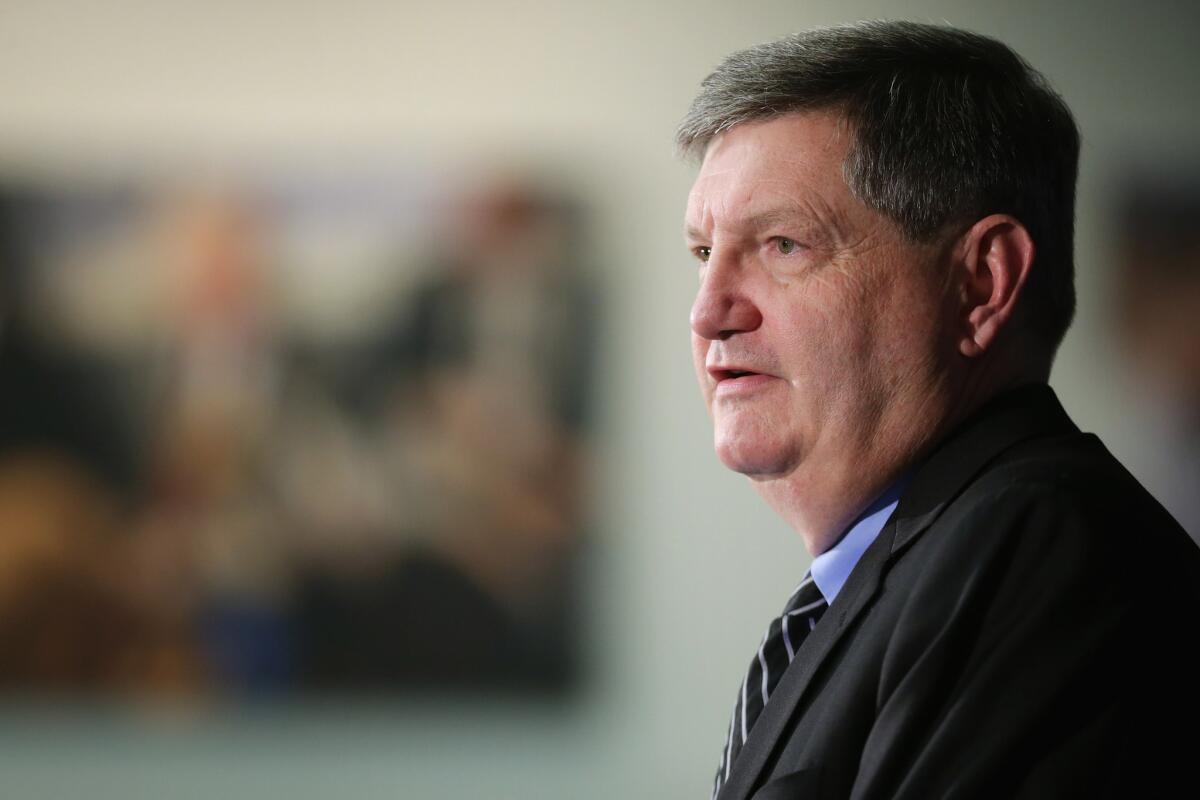New York Times reporter James Risen testifies in CIA espionage case

- Share via
Reporting from Alexandria, Va. — New York Times reporter James Risen testified Monday in advance of the trial of a former CIA officer charged with passing him classified information about Iran, answering only basic questions about his reporting.
At a hearing at U.S. District Court in Alexandria, Va., Risen initially refused to respond directly even to general questions from prosecutor James Trump, such as whether he had a confidentiality agreement with sources for his 2006 book “State of War, the Secret History of the CIA and the Bush Administration.”
The book revealed the existence of a CIA operation to derail Iran’s alleged nuclear weapons program by providing phony blueprints for production parts that would not function. The book alleged that CIA missteps led to the unmasking of several agents inside Iran.
Risen, who won a Pulitzer Prize for his reporting on the National Security Agency, said Monday he would not answer because it would help prosecutors “to create a mosaic to prove or disprove certain facts.” Risen is a former reporter for the Los Angeles Times.
For more than six years, federal prosecutors have waged a legal campaign to get Risen to testify that former CIA officer Jeffrey Sterling was a source for his book.
In June, the U.S. Supreme Court refused to hear Risen’s appeal of an order to say whether Sterling was his source, and it appeared he might go to jail rather than testify.
But the matter took a dramatic turn when Atty. Gen. Eric H. Holder Jr., stung by criticism of the Obama administration’s aggressive pursuit of reporters involved in national security leaks, said that no reporter would go to jail under his watch for doing his job.
The Justice Department’s high-level interest in the case was indicated by the presence in the courtroom of Director of Public Affairs Brian Fallon.
Prosecutors in the U.S. Attorney’s office in Alexandria were forced to scale back their demands for Risen’s testimony to basic answers confirming that he wrote the book, that Sterling was the source for two earlier newspaper stories in which he was named, and that he had confidentiality agreements with sources.
While at first it appeared that Risen would not cooperate even on some of those questions, he changed his mind after the prosecutor showed him affidavits that he had given years ago in which he had answered the same questions. Judge Leonie Brinkema noted that the previous statements had been made under penalty of perjury.
Risen said, as he has many times, that he would not identify his sources or even say where he was when he received the information, a key question that prosecutors need to address to establish jurisdiction for the charges in Virginia.
It was not clear Monday how much Risen had helped the prosecutors. In previous proceedings they said Risen’s testimony was essential to proving their case against Sterling, who recruited Iranians as agents for the CIA’s spying on Iran’s nuclear weapons program. They have obtained numerous telephone and email records of exchanges between the two men.
Sterling, who is black, had a falling out with the CIA in 2000, when he filed a complaint that he was being discriminated against by the agency because of his race. He left the agency two years later.
After Risen said he would not identify his sources, Sterling’s defense lawyer, Edward B. MacMahon Jr., asked the judge to dismiss the charges. Brinkema did not immediately rule on the motion.
Sterling’s trial is scheduled to begin next Monday and is expected to last roughly two weeks. It was not clear Monday whether Risen will be called to testify again during the trial.
More to Read
Sign up for Essential California
The most important California stories and recommendations in your inbox every morning.
You may occasionally receive promotional content from the Los Angeles Times.











